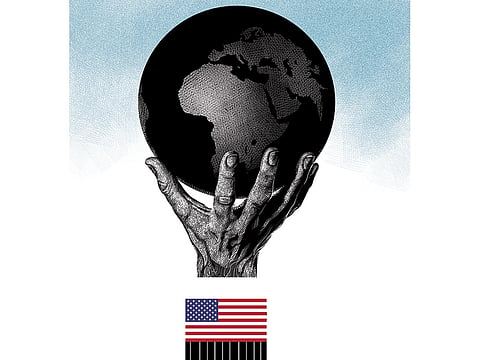Is America truly indispensable? Time to find out
Trump’s ill-considered refugee policy portends for the months and years to come and what it all says about America’s larger role in the world

The scenes over the weekend at American airports were both disturbing and inspiring. Disturbing because a cruel and ill-considered policy on refugees was implemented chaotically and unevenly.
Inspiring because of the spontaneous action taken by so many Americans in so many cities. Demonstrators crowded airport terminals from New York to Los Angeles while lawyers offered their services free of charge.
Disturbing because President Donald Trump suspended the US refugee programme for at least four months, barred the admission of Syrian refugees entirely, barred citizens of six other predominantly-Muslim countries from entering the US and ordered preferences in refugee applications for Christians over Muslims — and the opposition to all this broke almost entirely along partisan lines.
Inspiring because the actions of federal judges in New York and elsewhere to suspend at least part of Trump’s order are reminders that the US remains a nation of laws and is not governed solely by presidential whim.
And yet, ultimately, disturbing because of what all this portends for the months and years to come and what it all says about America’s larger role in the world.
Madeleine Albright famously called the United States the “indispensable nation.” That characterisation may induce eyerolls in much of the rest of the world, but it is one of the few things about which America’s bitterly divided Democrats and Republicans have long agreed.
Republicans tend to believe that the US should ‘lead’ by staking out a position and demanding that its allies fall into line. Democrats prefer, at least superficially, a more collaborative, multilateral approach — though like the GOP they assume this will still end with the US getting its way.
And Donald Trump? Judging by the last ten days his view seems to be that the US will do whatever it pleases and he doesn’t much care whether the rest of the world likes it or not. This is a far cry from Ronald Reagan’s vision of America as a “shining city on a hill.” It does not even have much in common with George W. Bush’s division of the world into friends and enemies.
Having alternately sought and grumbled about American leadership for decades, the international community seems likely to find out in the coming months and years what its absence will mean in practice. The biggest danger is that as the US retreats, other countries — including many that are no friends to Washington — will step in to fill the void.
Trump’s decision to pull the US out of the Trans-Pacific Partnership trade deal was inevitable, and might have happened under a Clinton presidency (Clinton turned against TPP after Bernie Sanders criticised her support of it during last year’s Democratic primaries). But Barack Obama was not lying when he warned that the pact, imperfect though it may be, is a powerful tool for writing the rules of global trade in ways that favour the democratic and capitalist world as opposed to China.
In Europe, not to put too fine a point on things, it is difficult to imagine any government official much caring what the US has to say about the Syrian refugee crisis anymore. That might change if Trump is really serious about establishing a safe zone for refugees inside Syria, but once the military explains the costs and risks of such a policy to him it is difficult to see Trump being any more enthusiastic about that option than Obama was before him. The result will be Russia, Turkey and Iran moving into the inevitable vacuum.
Inward-looking approach
And then there is the Gulf. What will an inward-looking America mean for the region? The belief in some quarters that 2015’s Iran Nuclear Deal marked an American turn away from its Arab allies and toward Tehran always represented a fundamental misunderstanding of US politics. No one in the Washington establishment is trying to promote Iranian hegemony in the Gulf and across the wider Middle East.
I don’t think anyone seriously believes what Trump has in mind, but it may ultimately be the result of his inward-looking approach to foreign affairs. Iranian hegemony in the Gulf. Vastly increased Russian influence from Syria to the Baltics. An Asian trade system dominated by, and ultimately subordinate to, China. None of these things has to happen, and perhaps none of them will. But the odds of all of them coming to pass are vastly greater if America turns its back on the world.
A Washington that (often thoughtlessly) throws its weight around has always been a cause for concern.
But a Washington that builds both literal and metaphorical walls around itself will soon find that the world outside has become even darker and more threatening than it otherwise would have been.
Gordon Robison, a longtime Middle East journalist and US political analyst, teaches Political Science at the University of Vermont.



